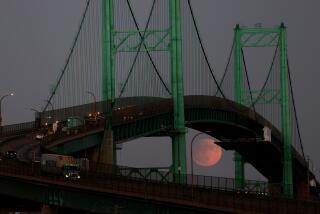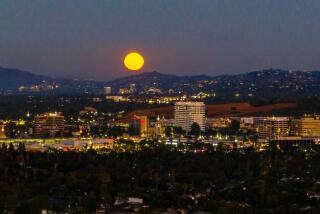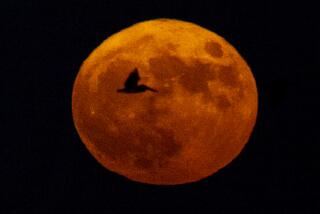Asteroid 45 miles wide will blot out a star tonight; watch it live
A space rock will blot out a star Wednesday night, and with a little luck, you can watch it live, right here.
A 45-mile wide asteroid will pass between the Earth and Regulus -- the 22nd brightest star in the night sky. The shadow of the asteroid will cause the star to blink out for as long as 14 seconds -- a subtle star eclipse.
Unfortunately, the astronomical event known as an occultation will be visible only along a narrow stretch of land here on Earth, so unless you live in New York or eastern Canada, you won’t be able to see it firsthand. (And if the weather is cloudy, even people along the occultation path won’t be able to see).
But don’t despair! The astronomy website Slooh.com will live stream the occultation from a telescope in New York and broadcast the feed to the rest of the world online (weather permitting). The live show starts at 10:45 p.m. PDT, but if you want to see only the eclipse, tune in just before 11 p.m. PDT. The occultation is expected to occur between 11:05 and 11:07 p.m. PDT, and remember -- it lasts for only a few seconds.
Astronomers who follow occultations are giddy about this particular one because it will be visible for such a heavily populated area (New York City) and because it will happen to such a bright star.
“I’ve been using a telescope to go after asteroid occultations of really faint stars for ages. I never thought we’d get one in my life that for a star this bright and easy,” said Alan MacRobert, a senior editor of Sky and Telescope in a statement.
Keep in mind that the celestial machinations that will cause Regulus to vanish for a few seconds are happening a great distance from us. The asteroid, known as Erigone, is 110 million miles from Earth in the asteroid belt between Mars and Jupiter. According to MacRobert, it is so small and far that it appears 26,000 times fainter than Regulus.
One warning note: Although Regulus is bright enough to be seen even in light-polluted areas, its occultation could be obscured by cloudy skies. And as of this writing, the weather wasn’t looking too good.
Fingers crossed astronomers!
If you love astronomy, the night sky, and the Internet, follow me on Twitter for more like this.







